Prime Minister Mark Carney and his environment minister aren’t saying whether Canada is still committed to meeting its climate goals under the Paris agreement by 2030, as the government faces criticism over his emissions reduction plans. The office of Environment Minister Julie Dabrusin said Canada is committed to reaching net-zero emissions by 2050 — but would not commit to the 2030 target when asked directly. “Taking into account the evolving global and economic context, the federal government will provide an update on its emissions reductions plan as we strive towards our 2030 and 2035 targets”. …Canada has a legal requirement to achieve net-zero by 2050. Part of its path to get there is a plan to cut emissions to at least 40% below 2005 levels by 2030 — a commitment set out in the Paris Agreement. The statement from Dabrusin’s office was the third time a member of Carney’s government declined to commit to the Paris target.

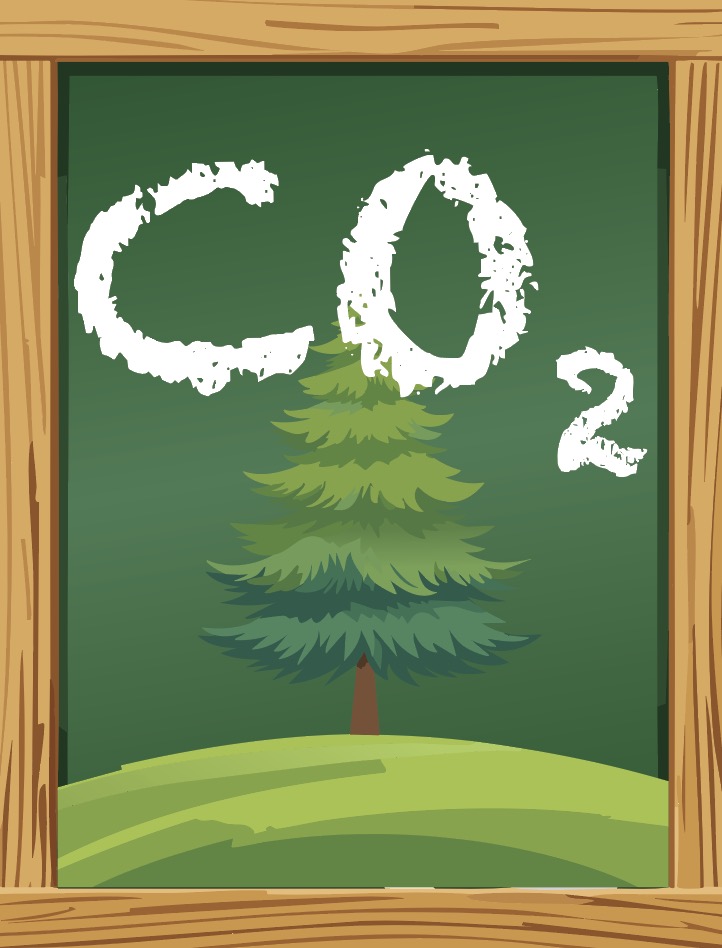 …Sweden, like Canada, sits atop vast boreal forests — part of the same great green belt circling the Northern Hemisphere. These forests act as planetary lungs, storing more carbon than even the Amazon. But the Swedish government’s latest forestry inquiry, En robust skogspolitik för aktivt skogsbruk, is heading in a troubling direction: grow more trees, cut them faster, and burn or export more biomass in the name of “green energy.” It sounds like a climate solution. But here’s the problem: forests are not factories. Most of the carbon in a boreal forest isn’t stored in the trees at all. It’s locked underground — in roots, fungi, humus, and delicate microbial networks built up over thousands of years. When forestry is intensified — shorter harvest cycles, heavier machines, wider clear-cuts — that underground bank of carbon is steadily drained. The trees grow back, yes, but the soil can take centuries to recover, if it recovers at all.
…Sweden, like Canada, sits atop vast boreal forests — part of the same great green belt circling the Northern Hemisphere. These forests act as planetary lungs, storing more carbon than even the Amazon. But the Swedish government’s latest forestry inquiry, En robust skogspolitik för aktivt skogsbruk, is heading in a troubling direction: grow more trees, cut them faster, and burn or export more biomass in the name of “green energy.” It sounds like a climate solution. But here’s the problem: forests are not factories. Most of the carbon in a boreal forest isn’t stored in the trees at all. It’s locked underground — in roots, fungi, humus, and delicate microbial networks built up over thousands of years. When forestry is intensified — shorter harvest cycles, heavier machines, wider clear-cuts — that underground bank of carbon is steadily drained. The trees grow back, yes, but the soil can take centuries to recover, if it recovers at all.
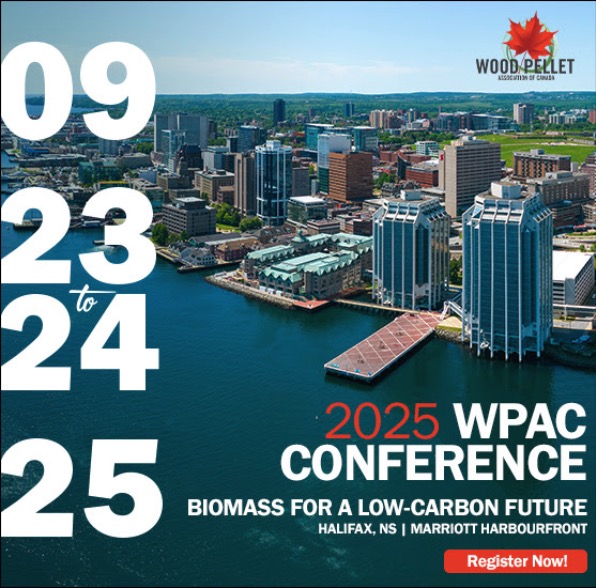 The Wood Pellet Association of Canada’s annual conference is just around the corner! Register now for one of the biggest draws of the WPAC annual event: the tour. This time it’s the day before the conference, when we’ll learn more about the people, facilities, and communities behind the sector. Depart from Halifax Marriott Harbourfront Hotel around 8:30 am and enjoy a scenic drive to Hardwood Lands, where you will see the Shaw Renewables pellet plant. From there, we will make our way back to Halifax, stopping at an installation or for a scenic break. We will tour the Port of Halifax in the afternoon and return to the hotel by 4:00 pm. Don’t miss this chance to be inspired by those in our sector who are committed to producing clean, renewable and responsible energy from Canadian wood pellets. Space is limited. Cost: $124/person
The Wood Pellet Association of Canada’s annual conference is just around the corner! Register now for one of the biggest draws of the WPAC annual event: the tour. This time it’s the day before the conference, when we’ll learn more about the people, facilities, and communities behind the sector. Depart from Halifax Marriott Harbourfront Hotel around 8:30 am and enjoy a scenic drive to Hardwood Lands, where you will see the Shaw Renewables pellet plant. From there, we will make our way back to Halifax, stopping at an installation or for a scenic break. We will tour the Port of Halifax in the afternoon and return to the hotel by 4:00 pm. Don’t miss this chance to be inspired by those in our sector who are committed to producing clean, renewable and responsible energy from Canadian wood pellets. Space is limited. Cost: $124/person

 Join Us in Halfax, Nova Scotia, September 23-24, 2025 for Biomass for a Low-Carbon Future. We are pleased to announce that the speaker line-up for more sessions has been finalized for the Wood Pellet Association of Canada Annual Conference in September. As the world moves toward a low-carbon future, biomass and wood pellets play a key role in ensuring Canada has renewable and responsible energy. Join us for Biomass for a Low-Carbon Future to explore the numerous opportunities biomass presents. Our keynote speaker, Dr. Jamie Stephen of TorchLight Bioresources, will explore how local biomass energy is the essential foundation for a competitive and prosperous Maritime economy. The event will also feature a Market and Policy Update: Navigating Regulatory Change. From the impacts of EU trade measures to the effects of U.S. tariffs on fibre supply and pricing, this session explores the economic and policy realities. Be a part of the dialogue transforming our future.
Join Us in Halfax, Nova Scotia, September 23-24, 2025 for Biomass for a Low-Carbon Future. We are pleased to announce that the speaker line-up for more sessions has been finalized for the Wood Pellet Association of Canada Annual Conference in September. As the world moves toward a low-carbon future, biomass and wood pellets play a key role in ensuring Canada has renewable and responsible energy. Join us for Biomass for a Low-Carbon Future to explore the numerous opportunities biomass presents. Our keynote speaker, Dr. Jamie Stephen of TorchLight Bioresources, will explore how local biomass energy is the essential foundation for a competitive and prosperous Maritime economy. The event will also feature a Market and Policy Update: Navigating Regulatory Change. From the impacts of EU trade measures to the effects of U.S. tariffs on fibre supply and pricing, this session explores the economic and policy realities. Be a part of the dialogue transforming our future.

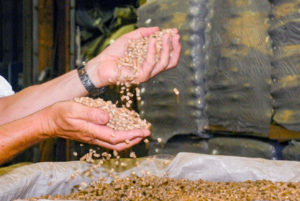 …In the aftermath of the earthquake and tsunami, Japan shut down not just Fukushima but all of its nuclear plants, a move that resulted in the loss of a third of its electrical power. …Japan faced a daunting energy crisis that it addressed… with conventional fuels such as natural gas and “bioproducts” including wood pellets derived from the logging of BC’s Interior forests. …Last year, roughly two million tonnes of those pellets arrived Japanese ports from BC, linked to a dozen mills in the province that make wood pellets derived from trees logged in the province’s rapidly dwindling primary forests — natural forests never previously subject to industrial logging. …Which means that in the name of creating allegedly clean energy, forests are being razed just to burn the wood. …The strain on the province’s stressed forests is [also] coming from other bioenergy producers, including those who want to use wood to make jet fuel.
…In the aftermath of the earthquake and tsunami, Japan shut down not just Fukushima but all of its nuclear plants, a move that resulted in the loss of a third of its electrical power. …Japan faced a daunting energy crisis that it addressed… with conventional fuels such as natural gas and “bioproducts” including wood pellets derived from the logging of BC’s Interior forests. …Last year, roughly two million tonnes of those pellets arrived Japanese ports from BC, linked to a dozen mills in the province that make wood pellets derived from trees logged in the province’s rapidly dwindling primary forests — natural forests never previously subject to industrial logging. …Which means that in the name of creating allegedly clean energy, forests are being razed just to burn the wood. …The strain on the province’s stressed forests is [also] coming from other bioenergy producers, including those who want to use wood to make jet fuel. THUNDER BAY — The Government of Ontario is protecting workers and jobs in the forest sector by investing over $6.2 million in research, innovation and modernization projects in Northwestern Ontario. As part of the government’s plan to protect Ontario, the investments from the Forest Biomass Program will boost Ontario’s forest sector’s competitive advantage by creating new jobs, increasing productivity and opening up opportunities for new revenue streams in new markets for underused wood and mill by-products, known as forest biomass. …Ontario’s investment is supporting
THUNDER BAY — The Government of Ontario is protecting workers and jobs in the forest sector by investing over $6.2 million in research, innovation and modernization projects in Northwestern Ontario. As part of the government’s plan to protect Ontario, the investments from the Forest Biomass Program will boost Ontario’s forest sector’s competitive advantage by creating new jobs, increasing productivity and opening up opportunities for new revenue streams in new markets for underused wood and mill by-products, known as forest biomass. …Ontario’s investment is supporting 



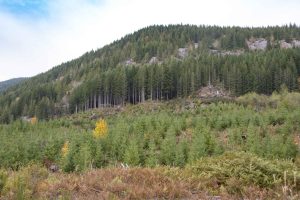 The climate crisis is forcing society to rethink existing technological and ecological systems. At the nexus of this challenge is how the US values and manages forests. Over the past 16 years, start-up carbon credit companies have been buying up hundreds of thousands of acres of American forestland to capture and store CO2. …So far, carbon storage policies or programs are underway in at least half of US states. …In 2021 the industry was worth $2 billion; by 2030 it’s projected to balloon up to $35 billion. …Some experts worry that forest carbon programs will someday threaten US wood supply, with the percentage of forests available for timber shrinking while the amount preserved as a climate mitigation tool increases. …And as the volume of harvested timber shrinks regionally, so do local economies in rural localities. …Analysts, like Russell, say “The world is wide enough for timber industry and natural capital markets to coexist”.
The climate crisis is forcing society to rethink existing technological and ecological systems. At the nexus of this challenge is how the US values and manages forests. Over the past 16 years, start-up carbon credit companies have been buying up hundreds of thousands of acres of American forestland to capture and store CO2. …So far, carbon storage policies or programs are underway in at least half of US states. …In 2021 the industry was worth $2 billion; by 2030 it’s projected to balloon up to $35 billion. …Some experts worry that forest carbon programs will someday threaten US wood supply, with the percentage of forests available for timber shrinking while the amount preserved as a climate mitigation tool increases. …And as the volume of harvested timber shrinks regionally, so do local economies in rural localities. …Analysts, like Russell, say “The world is wide enough for timber industry and natural capital markets to coexist”.
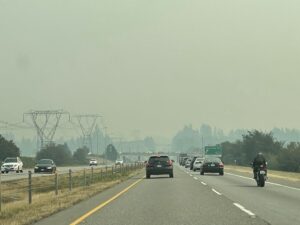 As wildfire smoke continues to drift into Michigan from Canada, experts say the increasing frequency and intensity of wildfires across North America are tied to a combination of climate change and decades of forest management practices. “Fires are a natural part of many forest ecosystems,” said Chad Papa, the Director of the Forest Carbon and Climate Program Department of Forestry at Michigan State University. “But what we’re seeing now is a major departure from historic fire regimes, with hotter, more catastrophic fires and slower forest recovery.” In the western U.S., a history of fire suppression and reduced timber harvesting has led to denser forests that are more prone to combustion. Laws enacted in the 20th century often restricted controlled burns, which experts said have contributed to overgrown conditions that increase wildfire risk.
As wildfire smoke continues to drift into Michigan from Canada, experts say the increasing frequency and intensity of wildfires across North America are tied to a combination of climate change and decades of forest management practices. “Fires are a natural part of many forest ecosystems,” said Chad Papa, the Director of the Forest Carbon and Climate Program Department of Forestry at Michigan State University. “But what we’re seeing now is a major departure from historic fire regimes, with hotter, more catastrophic fires and slower forest recovery.” In the western U.S., a history of fire suppression and reduced timber harvesting has led to denser forests that are more prone to combustion. Laws enacted in the 20th century often restricted controlled burns, which experts said have contributed to overgrown conditions that increase wildfire risk. The megabill President Trump signed into law this month is expected to make a major dent in the U.S.’s climate progress, adding significantly more planet-warming emissions to the atmosphere. Models of the legislation that have emerged since its passage earlier this month show U.S. emissions will rise as a result of its implementation. One from climate think tank C2ES found U.S. emissions will be 8 percent more than they would have been otherwise as a result of the package. “An 8% increase in our emissions is … still a massive amount of emissions,” said Brad Townsend, the group’s vice president for policy and outreach. Taking into account all of the efforts to reduce U.S. emissions over the last 20 years, Townsend said, the bill represents “rolling back a third of that progress with a stroke of a pen.” “From an emissions perspective, this bill is a disaster,” he said.
The megabill President Trump signed into law this month is expected to make a major dent in the U.S.’s climate progress, adding significantly more planet-warming emissions to the atmosphere. Models of the legislation that have emerged since its passage earlier this month show U.S. emissions will rise as a result of its implementation. One from climate think tank C2ES found U.S. emissions will be 8 percent more than they would have been otherwise as a result of the package. “An 8% increase in our emissions is … still a massive amount of emissions,” said Brad Townsend, the group’s vice president for policy and outreach. Taking into account all of the efforts to reduce U.S. emissions over the last 20 years, Townsend said, the bill represents “rolling back a third of that progress with a stroke of a pen.” “From an emissions perspective, this bill is a disaster,” he said.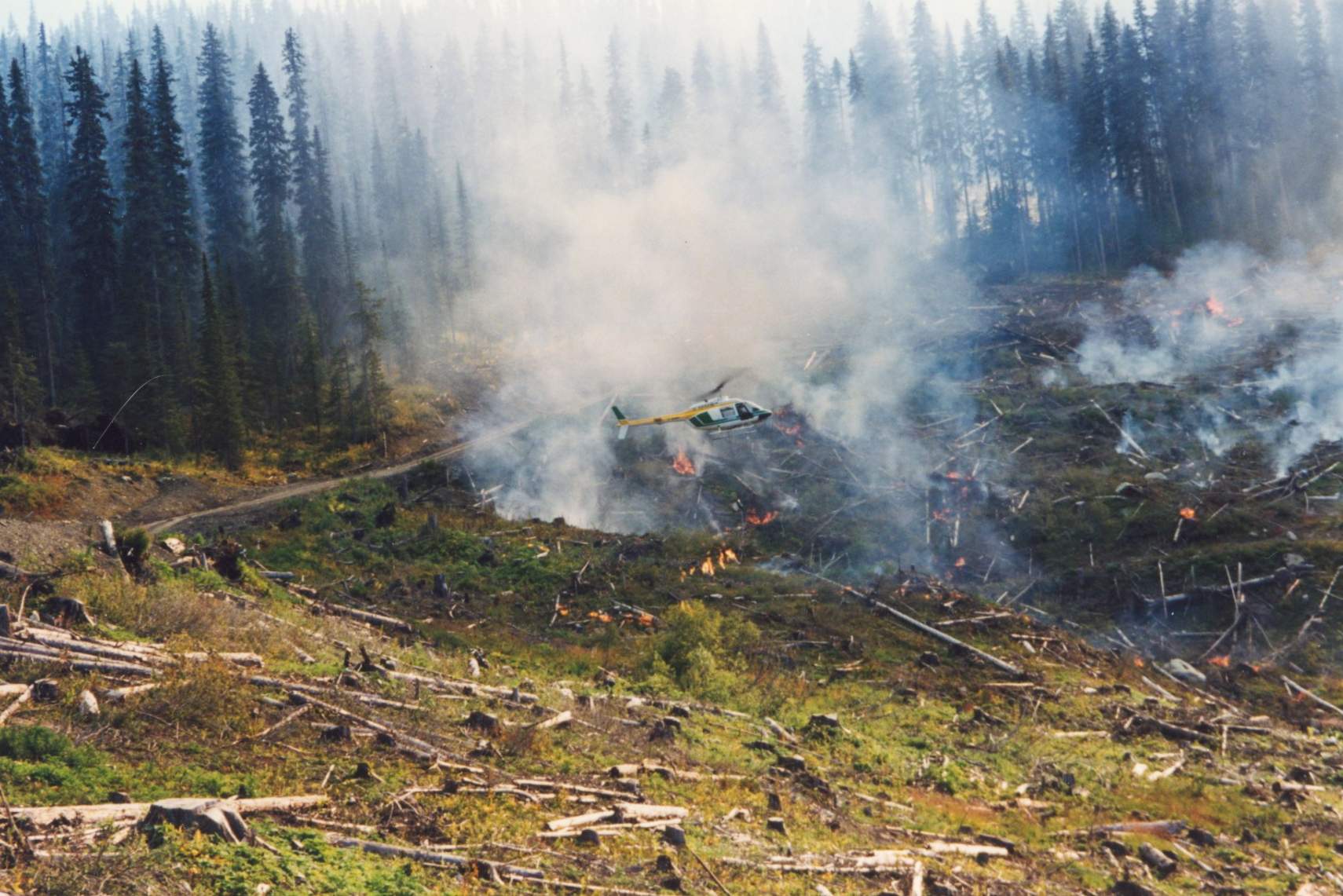 Western Washington state is one of the wettest places in the country. In the North Cascade mountains and on the Olympic Peninsula, lush cedars, ferns and mosses form classic Pacific Northwest rainforests. But even here, climate change is making wildfires more likely. And the state is figuring out how to respond. “It used to be that it really wasn’t until mid-August that fuels dried out in western Washington,” said Derek Churchill, a forest health scientist at the Washington Department of Natural Resources. “Now it’s July or earlier.” In fact, last month human activity started a wildfire in the Olympic national forest. As of Tuesday, it had grown to more than 5,100 acres and some campgrounds were under evacuation orders… But global warming is changing fire patterns in the state. Washington’s summers are growing longer, hotter and drier, resulting in an extended fire season with more desiccated fuel available. [A free account is required to read this article]
Western Washington state is one of the wettest places in the country. In the North Cascade mountains and on the Olympic Peninsula, lush cedars, ferns and mosses form classic Pacific Northwest rainforests. But even here, climate change is making wildfires more likely. And the state is figuring out how to respond. “It used to be that it really wasn’t until mid-August that fuels dried out in western Washington,” said Derek Churchill, a forest health scientist at the Washington Department of Natural Resources. “Now it’s July or earlier.” In fact, last month human activity started a wildfire in the Olympic national forest. As of Tuesday, it had grown to more than 5,100 acres and some campgrounds were under evacuation orders… But global warming is changing fire patterns in the state. Washington’s summers are growing longer, hotter and drier, resulting in an extended fire season with more desiccated fuel available. [A free account is required to read this article]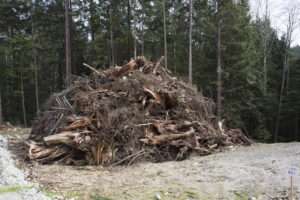 When seeking to make forests more fire resilient, removing fuels from the landscape is a tough task to make cost-effective. Thinning and limbing trees during fuels reduction treatments will sometimes produce marketable timber, but more often will produce small-diameter wood pieces that have traditionally been considered unmarketable. These pieces are typically chipped, masticated, or pile burned, and have long been considered ‘wood waste’. California researchers, industry leaders, and private forest landowners have been looking at ways to transform forest wood waste, particularly in wildfire-prone areas, into sustainable products. Utilizing forest biomass for building materials, soil amendments, and clean energy is a key strategy to economically incentivize improving forest conditions and can address both public and private industry needs. The state has also been making moves to decrease greenhouse gas emissions and aims to eliminate emissions entirely by 2045.
When seeking to make forests more fire resilient, removing fuels from the landscape is a tough task to make cost-effective. Thinning and limbing trees during fuels reduction treatments will sometimes produce marketable timber, but more often will produce small-diameter wood pieces that have traditionally been considered unmarketable. These pieces are typically chipped, masticated, or pile burned, and have long been considered ‘wood waste’. California researchers, industry leaders, and private forest landowners have been looking at ways to transform forest wood waste, particularly in wildfire-prone areas, into sustainable products. Utilizing forest biomass for building materials, soil amendments, and clean energy is a key strategy to economically incentivize improving forest conditions and can address both public and private industry needs. The state has also been making moves to decrease greenhouse gas emissions and aims to eliminate emissions entirely by 2045. 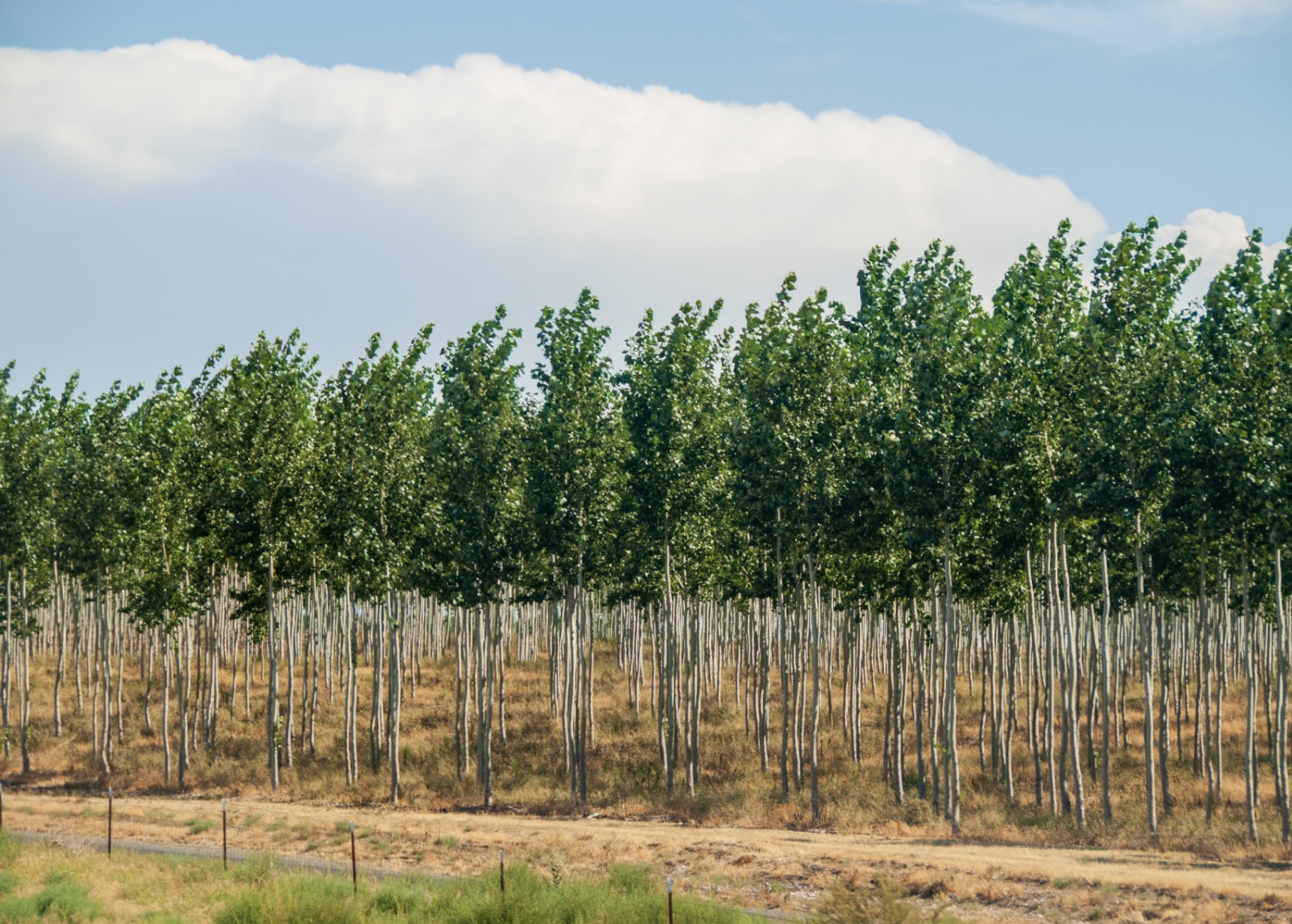 A new study, led by the University of Missouri, has uncovered how poplar trees can naturally adjust a key part of their wood chemistry based on changes in their environment. This discovery … could help create better biofuels and other sustainable products. The study, “Factors underlying a latitudinal gradient in S/G lignin monomer ratio in natural poplar variants,” was published in the journal Proceedings of the National Academy of Sciences. …”Understanding how plants make lignin could help us improve its conversion into high-value biomaterials and improve the competitiveness of U.S. biorefineries,” Jaime Barros-Rios, an assistant professor of plant molecular biology, said. Poplars are used in the paper and pulp industry. Now, they’re being explored as a source of bioenergy—fuels, plastics and other bioproducts. They are useful for scientific research because their genome has been fully mapped.
A new study, led by the University of Missouri, has uncovered how poplar trees can naturally adjust a key part of their wood chemistry based on changes in their environment. This discovery … could help create better biofuels and other sustainable products. The study, “Factors underlying a latitudinal gradient in S/G lignin monomer ratio in natural poplar variants,” was published in the journal Proceedings of the National Academy of Sciences. …”Understanding how plants make lignin could help us improve its conversion into high-value biomaterials and improve the competitiveness of U.S. biorefineries,” Jaime Barros-Rios, an assistant professor of plant molecular biology, said. Poplars are used in the paper and pulp industry. Now, they’re being explored as a source of bioenergy—fuels, plastics and other bioproducts. They are useful for scientific research because their genome has been fully mapped. On May 23, 2025, Maine’s Governor Janet Mills signed into law “An Act to Require Landowners to Report Their Participation in a Forest Carbon Program or Project”. The new law requires landowners enrolled in forest carbon credit programs or projects to report, on an annual basis, basic data on their participation in such programs to the state of Maine. …The purpose of the reporting requirement is to provide the state with visibility into the emerging carbon credit market and the amount of land in Maine enrolled in such programs. …However, a potential challenge arises if these credits are sold in external markets to offset emissions elsewhere. Maine’s robust forest products industry also has an interest in understanding how carbon credit project enrollment may impact the overall amount of land available for harvest.
On May 23, 2025, Maine’s Governor Janet Mills signed into law “An Act to Require Landowners to Report Their Participation in a Forest Carbon Program or Project”. The new law requires landowners enrolled in forest carbon credit programs or projects to report, on an annual basis, basic data on their participation in such programs to the state of Maine. …The purpose of the reporting requirement is to provide the state with visibility into the emerging carbon credit market and the amount of land in Maine enrolled in such programs. …However, a potential challenge arises if these credits are sold in external markets to offset emissions elsewhere. Maine’s robust forest products industry also has an interest in understanding how carbon credit project enrollment may impact the overall amount of land available for harvest. Researchers warn that simultaneous fires across Europe are overwhelming firefighting resources. Climate change made weather that fuelled Portugal and Spain’s deadly wildfires this summer around 40 times more likely, new research has found. Blazes in the Iberian Peninsula broke out at the end of July. Fuelled by temperatures above 40°C and strong winds, the flames spread extremely rapidly. The area burned by these wildfires has now broken records across Spain and Portugal. A new super rapid scientific analysis by World Weather Attribution (WWA) has found that these hot, dry and windy conditions were made more likely and more intense by human-caused climate change. Dr Clair Barnes, researcher for the Centre for Environmental Policy at Imperial College London, warns that the “astonishing” size of these fires is a “sign of what is to come” with hotter, drier, more flammable conditions becoming more severe with climate change.
Researchers warn that simultaneous fires across Europe are overwhelming firefighting resources. Climate change made weather that fuelled Portugal and Spain’s deadly wildfires this summer around 40 times more likely, new research has found. Blazes in the Iberian Peninsula broke out at the end of July. Fuelled by temperatures above 40°C and strong winds, the flames spread extremely rapidly. The area burned by these wildfires has now broken records across Spain and Portugal. A new super rapid scientific analysis by World Weather Attribution (WWA) has found that these hot, dry and windy conditions were made more likely and more intense by human-caused climate change. Dr Clair Barnes, researcher for the Centre for Environmental Policy at Imperial College London, warns that the “astonishing” size of these fires is a “sign of what is to come” with hotter, drier, more flammable conditions becoming more severe with climate change. Investors in Drax have a problem. Shares in the company that produces 10% of the UK’s renewable power plunged last week after the Financial Conduct Authority launched a probe into its financial reports. The investigation centres on whether the company had misrepresented the origin of the biomass pellets it burns to create electricity. …But even assuming Drax does what it says it does, it has a second problem. Its business model, reliant on burning imported sustainable biomass to generate power, is inherently controversial. Net zero supporters don’t think Drax is sustainable enough, fearing that forestry companies might classify more wood as rubbish if selling waste pellets became lucrative. …Drax may not be easy to like, but it does make up an important part of the UK energy system. …So far, politicians have walked a line, extending support but cutting its size.
Investors in Drax have a problem. Shares in the company that produces 10% of the UK’s renewable power plunged last week after the Financial Conduct Authority launched a probe into its financial reports. The investigation centres on whether the company had misrepresented the origin of the biomass pellets it burns to create electricity. …But even assuming Drax does what it says it does, it has a second problem. Its business model, reliant on burning imported sustainable biomass to generate power, is inherently controversial. Net zero supporters don’t think Drax is sustainable enough, fearing that forestry companies might classify more wood as rubbish if selling waste pellets became lucrative. …Drax may not be easy to like, but it does make up an important part of the UK energy system. …So far, politicians have walked a line, extending support but cutting its size.  STOCKHOLM — A political fight has erupted in Sweden over whether forest owners should be paid to delay harvesting trees as part of the country’s contribution to the EU’s ambitious carbon removal targets. The EU’s Land Use, Land Use Change and Forestry (LULUCF) regulation requires the bloc to remove 310 million metric tons of CO2 equivalent by 2030. With Sweden holding the EU’s largest forest area, the country is expected to play a central role in meeting that target. In 2022, the government commissioned a parliamentary committee to explore how to incentivize carbon storage. Its proposal: legally binding contracts offering landowners 400 SEK (~$42) per ton of CO2 if they delay felling their trees for 5 to 20 years beyond the minimum harvest age. …The plan has triggered fierce opposition. The Swedish Forest Industries Federation warns that 7,200 jobs are at risk, with smaller sawmills particularly vulnerable. …Supporters, however, argue that paying landowners reflects the forest’s true value.
STOCKHOLM — A political fight has erupted in Sweden over whether forest owners should be paid to delay harvesting trees as part of the country’s contribution to the EU’s ambitious carbon removal targets. The EU’s Land Use, Land Use Change and Forestry (LULUCF) regulation requires the bloc to remove 310 million metric tons of CO2 equivalent by 2030. With Sweden holding the EU’s largest forest area, the country is expected to play a central role in meeting that target. In 2022, the government commissioned a parliamentary committee to explore how to incentivize carbon storage. Its proposal: legally binding contracts offering landowners 400 SEK (~$42) per ton of CO2 if they delay felling their trees for 5 to 20 years beyond the minimum harvest age. …The plan has triggered fierce opposition. The Swedish Forest Industries Federation warns that 7,200 jobs are at risk, with smaller sawmills particularly vulnerable. …Supporters, however, argue that paying landowners reflects the forest’s true value. Energy company Drax is under investigation by the UK’s financial watchdog over the firm’s sourcing of wood for biomass pellets in the wake of whistleblower claims. The London-listed group said the Financial Conduct Authority (FCA) probe covers more than two years, from January 2022 to March 2024, and will also look at compliance of Drax’s annual reports from 2021, 2022 and 2023 with rules over listing, disclosure and transparency. Drax said it will “co-operate with the FCA as part of their investigation”. Shares in the FTSE 250 firm fell 8% in morning trading on Thursday. It follows accusations by Drax’s former head of public affairs and policy, Rowaa Ahmar, in March that the company had misled over its sourcing of wood for biomass pellets, which were made as part of her claim for unfair dismissal at an employment tribunal. Drax denied her claims. The firm and Ms Ahmar reached a settlement with Drax just over a week after the case opened.
Energy company Drax is under investigation by the UK’s financial watchdog over the firm’s sourcing of wood for biomass pellets in the wake of whistleblower claims. The London-listed group said the Financial Conduct Authority (FCA) probe covers more than two years, from January 2022 to March 2024, and will also look at compliance of Drax’s annual reports from 2021, 2022 and 2023 with rules over listing, disclosure and transparency. Drax said it will “co-operate with the FCA as part of their investigation”. Shares in the FTSE 250 firm fell 8% in morning trading on Thursday. It follows accusations by Drax’s former head of public affairs and policy, Rowaa Ahmar, in March that the company had misled over its sourcing of wood for biomass pellets, which were made as part of her claim for unfair dismissal at an employment tribunal. Drax denied her claims. The firm and Ms Ahmar reached a settlement with Drax just over a week after the case opened. Climate-heating emissions from wildfires in the European Union have surged to record levels this year as flames have engulfed over 1 million hectares of land – equal to 13 times the size of New York City – since January. Blazes sweeping through the continent – with major hotspots in Spain and Portugal – have so far released 38.37 million tonnes of carbon dioxide (CO2) emissions into the atmosphere, more than the annual CO2 emissions of Sweden, according to data from the European Forest Fire Information System (EFFIS). That’s more than double the average historical CO2 emissions recorded during the same months over the last 20 years. …Forests act as important carbon sinks, but when they burn, they release back into the atmosphere the carbon stored in the trunks, branches and leaves of their trees as well as in the soil. …Scientists have warned of the emergence of a ‘feedback loop’ between climate change and fires.
Climate-heating emissions from wildfires in the European Union have surged to record levels this year as flames have engulfed over 1 million hectares of land – equal to 13 times the size of New York City – since January. Blazes sweeping through the continent – with major hotspots in Spain and Portugal – have so far released 38.37 million tonnes of carbon dioxide (CO2) emissions into the atmosphere, more than the annual CO2 emissions of Sweden, according to data from the European Forest Fire Information System (EFFIS). That’s more than double the average historical CO2 emissions recorded during the same months over the last 20 years. …Forests act as important carbon sinks, but when they burn, they release back into the atmosphere the carbon stored in the trunks, branches and leaves of their trees as well as in the soil. …Scientists have warned of the emergence of a ‘feedback loop’ between climate change and fires.  “Protecting diversity tends to be an afterthought when it comes to carbon-offsetting projects,” says conservation scientist Aakash Lamba, a CNCS postdoctoral research fellow. “The narrative at the moment is usually carbon first, biodiversity second.”In certain reforestation initiatives, for example, a single tree species might be planted because it can grow quickly and absorb large amounts of carbon in a short span of time. But the lack of diversity in such monocultures can lead to a slew of problems, including increased disease risk and soil degradation. Recognizing the interconnectedness of biodiversity and carbon offsetting goals could unlock unforeseen opportunities and funding for conservation programmes, Koh points out. The centre’s researchers have set about detailing how ‘win-win’ conservation projects have already brought about both biodiversity gains and carbon mitigation benefits. India’s tiger reserves provide a prime example of how habitat protection leads to more intact ecosystems and bolsters carbon sequestration.
“Protecting diversity tends to be an afterthought when it comes to carbon-offsetting projects,” says conservation scientist Aakash Lamba, a CNCS postdoctoral research fellow. “The narrative at the moment is usually carbon first, biodiversity second.”In certain reforestation initiatives, for example, a single tree species might be planted because it can grow quickly and absorb large amounts of carbon in a short span of time. But the lack of diversity in such monocultures can lead to a slew of problems, including increased disease risk and soil degradation. Recognizing the interconnectedness of biodiversity and carbon offsetting goals could unlock unforeseen opportunities and funding for conservation programmes, Koh points out. The centre’s researchers have set about detailing how ‘win-win’ conservation projects have already brought about both biodiversity gains and carbon mitigation benefits. India’s tiger reserves provide a prime example of how habitat protection leads to more intact ecosystems and bolsters carbon sequestration. When we hear the terms “biodiversity crisis” and “mass extinction”, charismatic animals such as tigers, rhinos and sea turtles often spring to mind. But what about the small, inconspicuous species that play an important role in our ecosystems despite their size? Do they receive the attention and protection they need? Mosses may seem insignificant, but they form a rich and widespread group with around 20,000 species worldwide. Despite their small size, they play an important role in many ecosystems, for example by retaining moisture, serving as carbon sinks and contributing to nitrogen fixation in forests. Yet over 30 per cent of European species are endangered or potentially endangered. Many are poorly researched and often inadequately protected.
When we hear the terms “biodiversity crisis” and “mass extinction”, charismatic animals such as tigers, rhinos and sea turtles often spring to mind. But what about the small, inconspicuous species that play an important role in our ecosystems despite their size? Do they receive the attention and protection they need? Mosses may seem insignificant, but they form a rich and widespread group with around 20,000 species worldwide. Despite their small size, they play an important role in many ecosystems, for example by retaining moisture, serving as carbon sinks and contributing to nitrogen fixation in forests. Yet over 30 per cent of European species are endangered or potentially endangered. Many are poorly researched and often inadequately protected.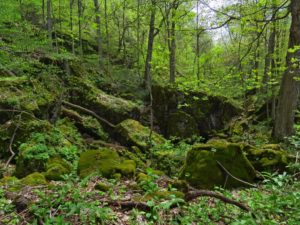 New research is now showing that this key carbon sink is weakening, and the decline is accelerating. A recent study published in
New research is now showing that this key carbon sink is weakening, and the decline is accelerating. A recent study published in  A lot of attention has been paid to how climate change can drive biodiversity loss. Now, MIT researchers have shown the reverse is also true: Reductions in biodiversity can jeopardize one of Earth’s most powerful levers for mitigating climate change. In
A lot of attention has been paid to how climate change can drive biodiversity loss. Now, MIT researchers have shown the reverse is also true: Reductions in biodiversity can jeopardize one of Earth’s most powerful levers for mitigating climate change. In  The top United Nations court has ruled that nations are obligated under international law to limit climate change, and countries that don’t act could be held legally responsible for climate damages elsewhere. The decision is a win for many small countries vulnerable to climate impacts, which pushed for the issue to be heard by the International Court of Justice (ICJ). It’s the court’s first major ruling on climate change, but the decision is only advisory, meaning that countries are not legally bound by it. Still, legal experts say it could be a boost for other climate change lawsuits pending in national courts around the world. “It’s really groundbreaking,” says Maria Antonia Tigre, director of Global Climate Change Litigation at Columbia Law School. “I think it will create this new wave of climate litigation.”
The top United Nations court has ruled that nations are obligated under international law to limit climate change, and countries that don’t act could be held legally responsible for climate damages elsewhere. The decision is a win for many small countries vulnerable to climate impacts, which pushed for the issue to be heard by the International Court of Justice (ICJ). It’s the court’s first major ruling on climate change, but the decision is only advisory, meaning that countries are not legally bound by it. Still, legal experts say it could be a boost for other climate change lawsuits pending in national courts around the world. “It’s really groundbreaking,” says Maria Antonia Tigre, director of Global Climate Change Litigation at Columbia Law School. “I think it will create this new wave of climate litigation.” A Norwegian start up is showing how a little black powder could have a big impact on farming — from healthier livestock to stronger soils and a more climate-friendly future. Why it matters: The ongoing emphasis on reducing antibiotic use in livestock production and increasing soil health means farmers are looking for new tools to help them achieve this. Obiochar, based in rural Norway about 120 kilometres north of Oslo, is using a fully automated system to turn biomass – in this case dead trees from nearby forests that can’t be used by the lumber industry – into a powerful tool for agriculture. And while biochar itself isn’t new, Obiochar ‘s unique, dual-focused approach to using biochar is setting it apart from its competitors. The company is developing biochar products both for livestock gut health in the form of feed additives and soil enhancement as an amendment.
A Norwegian start up is showing how a little black powder could have a big impact on farming — from healthier livestock to stronger soils and a more climate-friendly future. Why it matters: The ongoing emphasis on reducing antibiotic use in livestock production and increasing soil health means farmers are looking for new tools to help them achieve this. Obiochar, based in rural Norway about 120 kilometres north of Oslo, is using a fully automated system to turn biomass – in this case dead trees from nearby forests that can’t be used by the lumber industry – into a powerful tool for agriculture. And while biochar itself isn’t new, Obiochar ‘s unique, dual-focused approach to using biochar is setting it apart from its competitors. The company is developing biochar products both for livestock gut health in the form of feed additives and soil enhancement as an amendment.